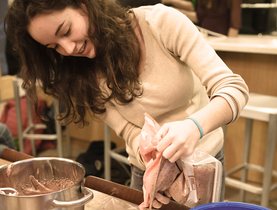
IRIS login | Reed College home Volume 96, No. 2: June 2017
Tags
"Paideia"
Paideia Pandemonium
Reed alumni have been even more passionate and engaged than usual in recent weeks over an issue that outsiders will find hard to fathom—Paideia.
Paideia is, of course, Reed’s “winter term.” During a week in January, students, alumni, and staff hold classes on any subject they deem worthwhile. From the geology of Portland to underwater basketweaving to how to play a didgeridoo, the classes range from the serious to the surreal. Dr Demento is a regular attraction. (I’ve held a “reporters bootcamp” for the last several years, in an effort to acquaint students with journalistic fundamentals. And in deference to those fundamentals, I should remind readers that I work at Reed and that my views are correspondingly colored-- see comments.)
Students gain no academic credit for these classes—indeed, most of them are one-time gatherings of like-minded souls who want to go birdwatching, deconstruct Zappa, or decorate Dixie cups.
Continue reading Paideia Pandemonium
The Joy of Cooking, (with methylcellulose)
If you're a foodie or a viewer of Bravo channel's Top Chef you're familiar with the culinary movement known as molecular gastronomy. This awkward combination of words describes an inventive way of cooking with the use of tools and food products you're not likely to find in the glossary of Irma Rombauer's cookbooks or by watching reruns of The French Chef.
These techniques and tools include mixing sodium alginate into, say, pureed peas and submersing the mixture in a bath of calcium chloride to create pea balls; using liquid nitrogen to freeze linguine into edible sculptures; and centrifuges that turn fruits into crystal clear yet still flavorful liquids.
Continue reading The Joy of Cooking, (with methylcellulose)


